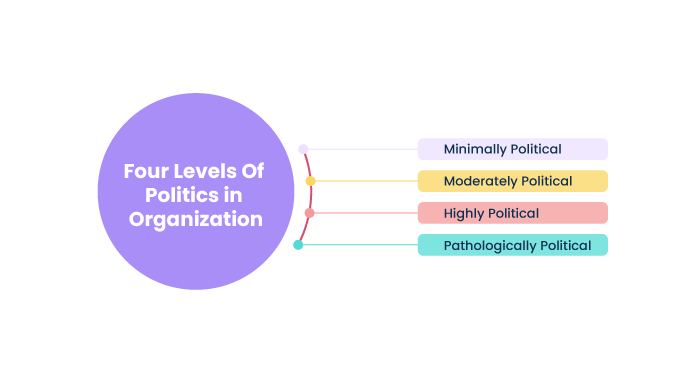Deconstructing Office Politics For A Better Understanding
As an HR or manager, navigating and managing office politics comes with the territory. But how do you get started? Let's find out.
The word politics carries a lot of negative connotations. And to be honest, office politics are no different.
When asked, most people would prefer to avoid it. Politics are a part of office life, and understanding the political climate is necessary.
Let's deconstruct office politics and what can be done to make navigating it easier.
What Is Office Politics?

Office politics refers to the complex hierarchy that exists in a workplace, which involves exhibiting power dynamics, authority, and delegation among coworkers.
Politics is the process of people forwarding their personal agendas, sometimes at the expense of others. However, it is possible to gain power and influence for yourself and your team without compromising your values or harming others.
The overall view of office politics is self-serving, giving it a negative connotation. At the same time, this is not always true.
Practicing 'positive politics' can help you further your and your team's interest fairly. Avoiding' negative politics' helps avoid needless conflict and being taken advantage of. However, we must look for different political landscapes in various organizations.
Four Levels Of Politics In Organization

Not every office is equally politicized. The levels and types of office politics vary depending on the organization. These are categorized into four levels-
- Minimally Political
- Moderately Political
- Highly Political
- Pathologically Political
Minimally Political
In minimally political companies, everything is, for the most part, out in the open. There is a sense of comradeship, rules are occasionally bent, and favors are granted. But there is no underhand method at work here.
A minimally political office environment is ideal for the political novice.
Moderately Political
Moderately political organizations also operate largely on formally sanctioned rules. Again, political behavior is low-key, and there is mostly a team player mentality.
This is a good environment for people who are not interested in politics but can take part if they need to.
Highly Political
A highly political arena is where not engaging in office politics can extract a price. Politics is an integral part of day-to-day life in such an environment. Formally sanctioned rules are often ignored or invoked only when convenient for those in power.
There are defined in-groups and out-groups. Who you know and have a relationship with matters more than your abilities.
Working in this type of environment can be very stressful. Only people who know the ropes or have political know-how are likely to do well in such an environment.
Pathologically Political
The most toxic form of business politics occurs in pathologically political organizations. Daily interactions are full of pitfalls. Getting anything done often takes a series of back-door deals. Circling about asking for permissions or long formalities is the only way to get the job done.
There is no trust or feeling of camaraderie. Most of the time is spent watching your own back out of necessity.
The pathologically political environment is not productive for work and is very determinant for the company's growth. Thankfully most of us do not work in such environments.
Every workplace is unique. So it makes sense that the political environment of every company will differ. A highly toxic work environment is rare; finding a work environment with no politics is also nearly impossible.
Having political awareness is always beneficial. Let's understand the reasons for workplace politics.
Reasons Behind Office Politics

The political environment of an organization is dependent on innumerable factors. Some of which are listed below.
1. People willing to come into the limelight without much effort depend on office politics.
Some individuals want to advance their careers but are unwilling to put in the effort. Such individuals have no choice but to depend heavily on office politics. They try their level best to make themselves shine by putting others down.
2. Personal Relationships
Personal feelings bleeding onto work life can lead to politics. Treating individuals differently, especially due to personal relationships, must be avoided in a work environment.
3. Blame Games
Sticking to the facts while pointing out mistakes is very important.
Discussions about errors can quickly turn into blame games. But everyone's opinion matters and should be respected.
4. Lack of Trust
Trust is an essential component of work culture. When you break someone's confidence, you do not just lose their trust but also your credibility. Lack of trust is a determinant to the work environment as employees will spend more time watching their back than working.
Snitching or going behind someone's back might gain you some short-term benefits but will backfire in the long run.
5. Manipulations
Manipulation of information is also a huge contributing factor to politics. Information should be passed factually to avoid confusion in the workplace.
6. Gossips
Unnecessary gossip also gives rise to politics. Instances like leg-pulling, criticism, and backstabbing all lead to a high level of politics. Gossiping is usually indulged in by jealous employees who cannot see others advancing.
All these factors contribute greatly to office politics. Too much negative politics in the workplace can negatively impact the work environment. Let us now look at some of the effects.
Effects Of Politics On Organization And Employees

1. Decrease in overall productivity
Employees that indulge more in politics have been observed to be less attentive to their work.
They are more interested in criticizing others. This brings down their work output and the organization's productivity.
As a result of politics in the workplace, employees fail to achieve targets within the stipulated time frame. Work gets delayed in such an organization.
2. Affects Concentration
The more interested an individual is in spoiling others' image. The more they fail to concentrate on their work.
More mistakes are made by individuals that heavily indulge in politics as their focus is somewhere else.
3. Spoils the Ambience
Politics leads to a negative environment in the workplace.
It spoils the relationships among individuals. All dislike an individual playing politics in the organization.
4. Changes in the Attitude of Employees
Too much politics makes even serious employees lose interest in work and attend office just as an obligation.
Internal politics can prevent employees from fully engaging at work, as they may be more concerned with their interests.
No matter how much hard work an employee puts in, it is often ignored in a politically driven organization.
5. Demotivated employees
A non-performer can be the boss's favorite simply due to politics, thus demotivating the performers.
Discussions are essential at the workplace to extract the best out of employees. Evaluating the pros and cons of an idea always helps in the long run. Employees playing politics always look for an opportunity to tarnish the image of their fellow workers.
An unfair reward structure due to politics leads to demotivated employees.
6. Increases Stress
Lack of confidentiality creates a very stressful environment. In such an environment, employees must be careful about what they say.
Individuals are not machines who can work uninterrupted for 8-9 hours without socializing with others. You need to be able to trust your friends at work, especially if the environment is political and distrustful.
7. Wrong Information
Employees indulging in politics manipulate information, which is never passed on in its desired form.
Superiors get the wrong picture of what is happening in the organization.
A wrong person walks away with the credit in an organization where employees are indulged in politics.
Role Of Management In Avoiding Politics

Management plays an important role in keeping office politics reasonable. This is especially true for human resource management. HR handles managing the employee lifecycle and hence plays a vital role in maintaining a peaceful work environment.
Let's look at a few steps management and hr can take to avoid office politics.
1. Hire the Right Fit for the Organization
The HR department often favors competency over personality during the hiring process, which can lead to a turbulent work environment. Competency can be compensated through various employee development programs but cannot rewrite their character.
So, it would help if you also looked at the right cultural fit while hiring other than the career success stories. It includes the candidate's behavior, perception, attitude, etc. In this regard, you must run thorough background checks to know the different employee persona of your organization as well.
2. Open Communication
Decisions that affect the majority must consider the majority's opinions. Open discussions in the workplace can help prevent a clique or group from making all important decisions.
HR software promoting employee communication helps prevent gossip, leading to politics.
3. Team Bonding
A team that plays well together will also work well together. Team members' proper support and understanding lead to a pleasant work environment. Team building exercises, team outings, official parties, social networking, etc., are some ways to achieve this.
4. Respect
Mutual respect at all company levels is essential, be it at the top, middle, or lower-level executives. Workers should respect one another despite their differences in work and status in a company. This brings a sense of belonging to the workplace.
Furthermore, it will also help keep the pessimism away. All this contributes to fewer workplace political issues.
5. Uniform Policies
Most companies may have different policies for various departments like production, marketing, sales, etc. This difference in policies may bring prejudice in the workplace, especially if they are related to employee benefits.
HR and management should pay attention to this and keep uniform policies for all departments. It will promote equality in the workplace.
6. Fair Recognition
Credit hogging is one of the most negative aspects of politics in the workplace. Taking credit for another's work is unethical and very determinant for employee satisfaction in the organization.
The HR department should confirm the work of executives with their managers to ensure accuracy and credibility. Before giving recognition at work, always ensure that the person getting the distinction is the one who did the job.
7. Feedback
Employee feedback has always been an effective way of understanding what's wrong with a system. This will help you rebuild a better one. When employees can share their feedback with management, it helps to reduce gossip and create a more positive work environment.
In some cases, workers may find it difficult to speak up about issues they are having in the workplace. An anonymous messaging system will help resolve this issue with ease.
In Closing
Politics as a whole is an integral part of work culture. Removing politics from work is nearly impossible, but what can be done is to regulate politics to a manageable level.
Politics is a complex and inevitable part of social structure. It is neither positive nor negative in itself. Since you cannot avoid it, getting the necessary political know-how is imperative to thrive in an office social structure.
FAQs
Q. How can office politics affect my career growth and professional development?
A. Office politics can affect career growth and professional development by impacting job performance, visibility, and opportunities for advancement. The ability to navigate office politics is essential to securing career opportunities, building relationships with colleagues, and becoming an effective leader.
Q. How can I manage my emotions and avoid getting caught up in office politics drama?
A. Maintaining a positive attitude, seeking feedback, and practicing self-care are the keys to managing emotions and avoiding office politics drama. Furthermore, they should maintain a professional demeanor, avoid gossip, and focus on achieving shared goals.
Q. How can you balance competing priorities and interests when navigating office politics?
A. To balance competing priorities and interests you need to be clear about your goals and priorities, prioritizing tasks and responsibilities, and communicating openly and honestly with colleagues.
Q. What are some strategies for building a strong network of allies and supporters to help navigate office politics?
A. The key to building a strong network of allies and supporters is to be approachable and friendly, to participate in team-building activities, to seek out mentors and sponsors, and to be willing to assist others.
Q. How can you hold employees accountable for engaging in negative office politics?
A. You can hold employees accountable by establishing clear expectations and consequences, documenting incidents, and addressing issues promptly and professionally.


















